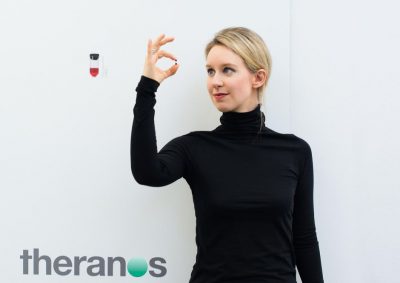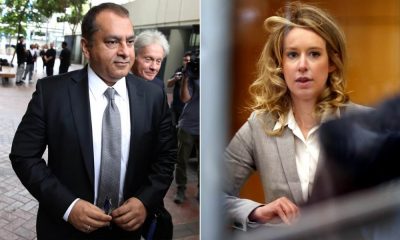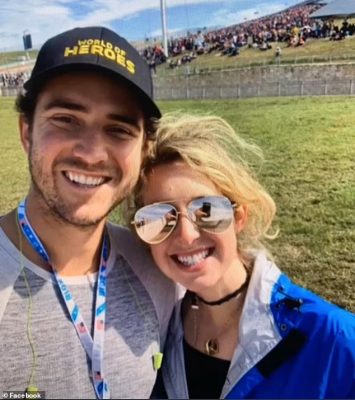
She was “the world’s youngest self-made female billionaire”, trumpeted Forbes magazine. The “next Steve Jobs”, said Inc, another business magazine that put her on the cover.
In 2014, Elizabeth Holmes, then 30 years old, was on top of the world. A Stanford University drop-out, she had founded a company valued at $9bn (£6.5bn) for supposedly bringing about a revolution in diagnosing disease.
With a few drops of blood, Theranos promised that its Edison test could detect conditions such as cancer and diabetes quickly without the hassle of needles. Bigwigs from Henry Kissinger to Rupert Murdoch invested.
But by 2015, the seams were coming apart, and within a year, Ms Holmes was exposed as a fake. The technology she touted didn’t work at all, and by 2018 the company she founded had collapsed.
Ms Holmes, now 37, faces up to 20 years in prison if found guilty of the 12 charges of fraud against her. She has never previously told her side of the story.
Her trial which begins next month, US v Elizabeth Holmes, et al, will be closely watched and she is expected to plead not guilty.
And in a twist, it emerged this weekend that her lawyers will argue that her ex-boyfriend and business partner, Ramesh “Sunny” Balwani, sexually abused and emotionally controlled her at the time of the alleged crimes, impairing her mental state.

Mr Balwani, 56, who faces the same fraud charges, called the claims “outrageous”. It will be up to a jury to decide with what sympathy or harshness to judge the woman who fooled everyone from statesmen to secretaries.
High pressure beginnings
Despite being the subject of a book, HBO documentary and an upcoming TV series and film, it is still unclear why Ms Holmes took such a gamble on technology she knew didn’t work.
She was raised in a comfortably well-off family in Washington DC, and was a polite but withdrawn child, according to people who knew her.
Inventor and businessman Richard Fuisz, 81, speculates there must have been immense pressure on Ms Holmes to succeed. His family lived next door to the Holmes for years but they fell out when Theranos sued him over a patent dispute in 2011 (it was later settled).
Ms Holmes’ parents spent much of their careers as bureaucrats on Capitol Hill but “they were very interested in status” and “lived for connections”, he told the BBC. Her father’s great-great grandfather founded Fleischmann’s Yeast, which changed America’s bread industry, and the family was very conscious about its lineage, he said.
At age nine, the young Elizabeth wrote a letter to her father declaring that what she “really want[ed] out of life is to discover something new, something that mankind didn’t know was possible to do”.
When she got to Stanford University in 2002 to study chemical engineering, she came up with an idea for a patch that could scan the wearer for infections and release antibiotics as needed.
At 18, she already displayed an intransigence that would apparently continue and drive the company she would found the following year.
Phyllis Gardner, an expert in clinical pharmacology at Stanford, recalled discussing Ms Holmes’s skin patch idea and telling her it “wouldn’t work”.
“She just stared through me,” Dr Gardner tells the BBC.
“And she just seemed absolutely confident of her own brilliance. She wasn’t interested in my expertise and it was upsetting.”
Meteoric rise
Months later Ms Holmes dropped out of Stanford aged 19 and launched Theranos, this time coming up with an apparently revolutionary way of testing blood from a simple finger prick.
Powerful people were enthralled and invested without seeing audited financial accounts.
US Treasury Secretary George Schultz decorated Marine Corps general James Mattis (who later served in the Trump administration) and America’s richest family, the Waltons, were among her backers.
The support lent her credibility, as did her demeanour.
“I knew she’d had this brilliant idea and that she had managed to convince all these investors and scientists,” says Dr Jeffrey Flier, the former dean of Harvard Medical School, who met her for lunch in 2015.
“She was self-assured, but when I asked her several questions about her technology she didn’t look like she understood,” adds Dr Flier, who never formally assessed her technology. “It seemed a bit odd but I didn’t come away thinking it was a fraud.”
Dr Flier ended up inviting her to join the medical school’s Board of Fellows, which he regrets, although she was removed when the scandal broke.
It began to unravel in 2015 when a whistleblower raised concerns about Theranos’s flagship testing device, the Edison. The Wall Street Journal wrote a series of damning exposes claiming the results were unreliable and that the firm had been using commercially available machines made by other manufacturers for most of its testing.
Lawsuits piled up, partners cut ties and in 2016 US regulators banned Ms Holmes from operating a blood-testing service for two years.
In 2018 Theranos was dissolved.
Abuser or abused?
In March that year, Ms Holmes settled civil charges from financial regulators that she fraudulently raised $700m from investors.
But three months later she was arrested, along with Mr Balwani, on criminal charges of wire fraud and conspiracy to commit wire fraud.
Prosecutors claim she knowingly misled patients about the tests and vastly exaggerated the firm’s performance to financial backers.
Ms Holmes was released on bail and in 2019 got married to William “Billy” Evans, 27, an heir to the Evans Hotel Group chain of hotels. They had a son in July this year.

“I don’t think her being a new mother will influence the trial but the judge is likely to take it into account if she is found guilty,” says Emily D Baker, a former deputy district attorney for Los Angeles and legal commentator who is not connected to the case.
As the Theranos scandal reaches trial, commentators say it is remarkable how tightly she has clung to her original story and people who knew her say they doubt she has changed.
According to court papers, Ms Holmes’ lawyers are set to argue that “she believed any alleged misrepresentations” about Theranos were true and that it was a “legitimate business generating value for investors”.
They are also likely to claim that Mr Balwani’s alleged controlling behaviour “erased her capacity to make decisions”, including her ability to “deceive her victims”.
They say Theranos’s former chief operating officer – who will be tried separately next year – controlled how she dressed, what she ate and with whom she spoke for over a decade. They will also call a psychologist specialising in sexual abuse as a witness.
Whether Ms Holmes will take the stand herself is unclear.
“The toughest thing with any case involving fraud is proving that the person intended to defraud,” says Ms Baker.
“So prosecutors will have to use her texts and emails, and argue that she knew the technology didn’t work but said it did anyway.”




